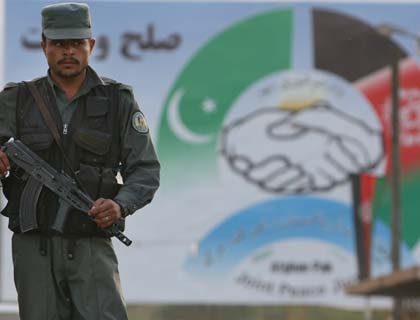President Hamid Karzai or any Government official has not denied the media reports about "Pakistani demands from Afghanistan" in the recent high-profile visit from Rawalpindi and Islamabad to the presidential palace in Kabul. The discussions in different circles of Kabul are all about the "letter" of those demands handed over to President Karzai, and questions are being raised in media and by politicians that the details should be revealed.
However, the President has yet to officially confirm or deny any such "demands" that include points like; Pakistan should be consulted on the Afghan Security Forces affairs of Ministry of Defense, Ministry of Interior, National Directorate of Security—Afghan intelligence agency—and any strategic agreement between Afghanistan and the US or NATO. Furthermore, recruitment of Pakistani cadres in the Afghan Government institutions, share in the Afghan mines and development projects, implementation of Pakistani strategies by future Afghan governments and the most important of all—for Pakistan—closure of Indian consulates in Afghanistan.
Reports suggest that all these demands have been handed over to President Karzai by Pakistani Prime Minister Yousaf Raza Gilani in the recent visit accompanying him the top brass of Pakistan's military establishment, Army Chief Gen. Ashfaq Pervez Kayani and ISI Chief Lt.-Gen Shuja Pasha. It's very unusual that the power trio from Pakistan come to Kabul all together, including key members of the civilian Government in Islamabad.
The above "demands" might not be all true as leaked in media with details, though President Karzai has not rejected yet. However, there have been talks and "demands" of the sort. What the Government should know is that the surprise influx of the Pakistani delegation to Kabul is not a change in strategy because of the efforts of President Karzai, who had been asking for inclusion of the top Pakistani military officials in the Af-Pak Commission, the establishment of which was agreed long ago, but the decision makers in Rawalpindi were not part of it. ISI Chief Pasha was in the US recently for talks with American military and CIA officials after the recent spat between the two "allies of the war on terror". The relations were particularly bitter after the case of Raymond Davis, CIA-related American who was arrested in Lahore, and the CIA drone attacks on the terrorist sanctuaries in Waziristan and other tribal areas.
The context of above demands are after the "acceptance" of President Karzai's request to Pakistan for inclusion of the military and intelligence officials in the Af-Pak Commission headed by the executives of both the countries. And this acceptance came as a surprise after the visits of ISI Chief to the US, France and Turkey, with failed results of the talks to cool down ISI-CIA spat. All the recent developments are as a result of the deterioration of Pak-US relations.
The likes of above demands show the lens through which Pakistani military establishment eyes Afghanistan and claims a "strategic depth". Now that it has been leaked in media, President Karzai has better to make it clear in public, like the way he talks about the Strategic Agreement between the US and Afghanistan, on which he has decided to call a Loya Jirga.
The prospects of success with the new commission that include executives, top military and intelligence officials of both countries are as murky as previous such commissions. Expectations of both sides are in contrast, and there are differences. President Karzai has been calling the US and NATO to "target the roots and sanctuaries of militants across the border" since long ago. His latest statement on this was recently in a speech after the attack on Kandahar Police Chief. But not only Pakistan Army has been denying the Afghan and US demands for military operation in North Waziristan—the hub of Al-Qaeda and Afghan militants including the Haqqani Network—also the delegation in Kabul even did not admit any militant sanctuary in North Waziristan.
President Karzai thinks his efforts to talk with Taliban will only succeed when the military-intelligence establishment of Pakistan supports it and helps bring the militants on table talks. But the question is, if Pakistani military do not admit any sanctuary in North Waziristan, or ties with Haqqani Network, how successful the commission will be? Without a military operation to hunt down Al-Qaeda and other militants in North Waziristan, there are no prospects of success. The militant groups who are beyond the influence and control of Pakistani army/intelligence, like the different factions of Pakistani Taliban who are involved in sending suicide bombers to Afghanistan, makes it more improbable.
We also know that the former Taliban officials, like Mutawakil and Mullah Zaeef, who have been making headlines of the talks about talks with the Taliban, are staunch anti-Pakistan, and against any role of Pakistani intelligence or army in the talks. This is not something to help the process of persuading the Kandahari faction and Quetta Shura of Taliban leadership and second-level militant commanders.
The most important aspect of any prospect is that all Taliban and other militants have been saying to take part in any talks only when all foreign troops withdraw from Afghanistan, and we know this is not going to happen. Insurgents are taking the calls of talks from the Afghan Government and willingness of the US as a victory and becoming more radical in their stance and bloody in attacks, as has proved by the recent suicide bombings on Afghan security forces in the last couple of weeks, which Taliban has called a spring start, warning of a "summer spectacular" ahead.
An Af-Pak "cooperation" which is based on the deterioration of relations between the US and Pakistan is not going to make any success. And President Karzai should know that the surprise change is not because of his efforts, which he thinks, but the relations of Pakistan Army with the US.
But above all these, what makes it ridiculously impossible are those demands which President Karzai has yet to make clear. If not, public will take a silence as submission to those demands.

